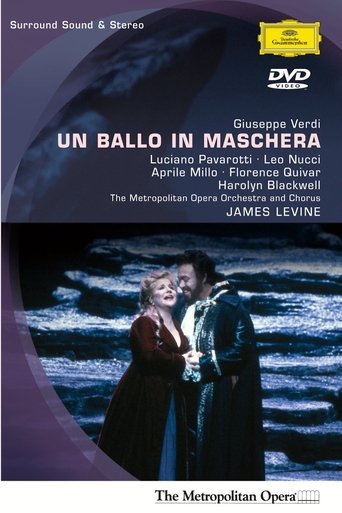
26 Jan 1991

Un Ballo in Maschera
Verdi's opera performed by the Metropolitan Opera Orchestra and Chorus, conducted by James Levine.
This 2003 performance of Georges Bizet's 19th century opera Carmen was produced and directed by filmmaker and stage director Franco Zeffirelli, best known to many for the Academy Award-winning big-screen adaptation of Shakespeare's Romeo and Juliet. Shot at the Arena di Verona, the production features Marina Domashenko in the title role and music by the Orchestra of the Arena di Verona under conductor Alain Lombard.

Carmen

Don José
Escamillo
Micaëla
Moralès
Le Dancaïre
Le Remendado
Frasquita
Mercédès

Self - Conductor

26 Jan 1991

Verdi's opera performed by the Metropolitan Opera Orchestra and Chorus, conducted by James Levine.
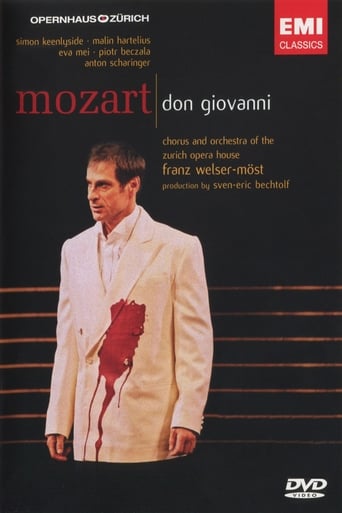
07 May 2006

Live performance Zürich, May and July 2006. Modern dress performance which generated mixed reactions.
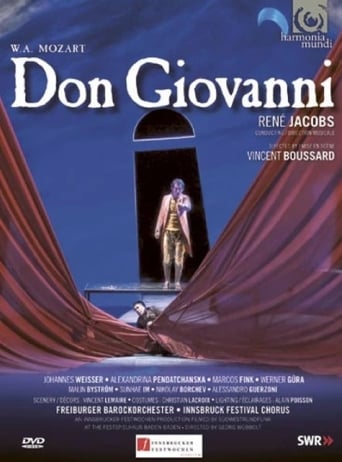
06 Oct 2006

Live performance filmed at the Innsbrucker Festwochen on 6 October 2006 at the Festspielhaus in Baden-Baden of Wolfgang Amadeus Mozart's opera Don Giovanni. Marcos Fink, Werner Güra and Alexandrina Pendatchanska perform as the principals, while the Freiburger Barockorchester and the Innsbruck Festival Chorus provide accompaniment. Georg Wübbolt directs.

23 May 2013

A live recording of Don Giovanni from the Festspielhaus Baden Baden, recorded on May 23rd 2013.
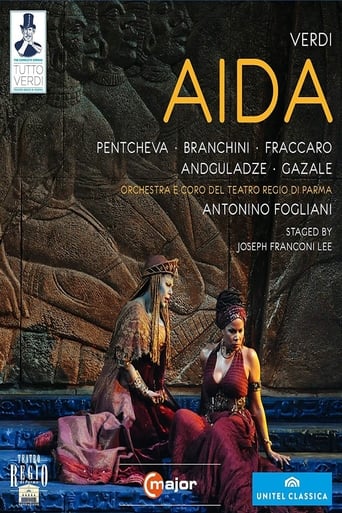
28 Feb 2012

Very nice set and costumes by Mauro Carosi. The procuction is well staged in the relatively small scene at Parma by Joseph Franconi Lee. Here's a performance that really works.Everything seems just right, but if you MUST have the top soloists (Pavarotti, Domingo...), look elsewhere. However, I think that the ones here (Susanna Branchini (Aida), Mariana Pentcheva (Amneris), Walter Fraccaro (Radames), Alberto Gazale (Amonasro), Carlo Malinverno (Il Re di Egitto) do a fantastic job. Also pluses for the ballet and the video production.
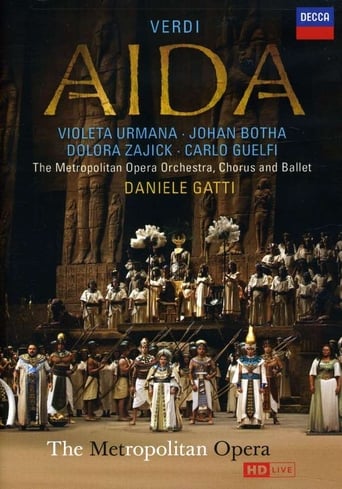
24 Oct 2009

Aida (2009) Metropolitan Opera. Verdi / Italian. Live from the Met 2009.
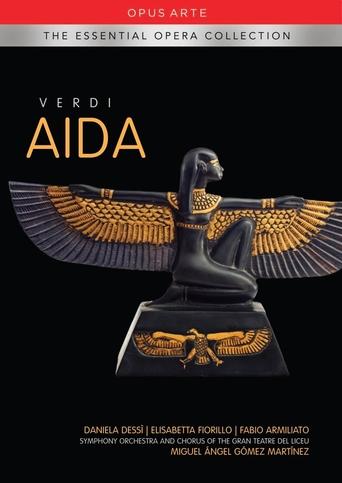
21 Jul 2003

tt2266516. Aida (2003) Gran Teatre del Liceu. Verdi / Italian. Filmed at the Gran Teatre del Liceu, Barcelona, Daniela Dessì, Elisabetta Fiorillo, Fabio Armiliato, Juan Pons and Roberto Scandiuzzi lead the cast in the renowned period production filmed in 2003 against the historic paper trompe-l'œil sets painted between 1936-45 by Josep Mestres Cabanes, the last representative of the old Catalan school of scenography. Mestres Cabanes worked on his Aida vision for eight years. The opulent staging he created in 1945 is here in every detail. The seven magnificent sets he painted for Aida in 1945 have been subtly and painstakingly restored by Jordi Castells and his team – revealing the palaces, temples and surroundings of Memphis and Thebes which the set designer had wanted to evoke in his historical yet also fantasy-like vision.

01 Aug 1985

tt0253843. Il Trovatore (1985) Verona. Verdi / Italian. Reynald Giovaninetti conducts the Orchestra of the Arena di Verona in a performance of Verdi's 'Il Trovatore'. The international cast includes Giorgio Zancanaro and Rosalind Plowright. The Count Di Luna believes that his younger brother was murdered years before by a vengeful gypsy, but still hopes that he may be alive. When he attempts to court the beautiful Leonora, he is enraged to discover that she has a lover - the troubadour, Manrico. Manrico and the Count duel, and afterwards Manrico reveals to Azucena, the woman he believes to be his mother, that when he had the opportunity to kill the Count he felt something holding him back.
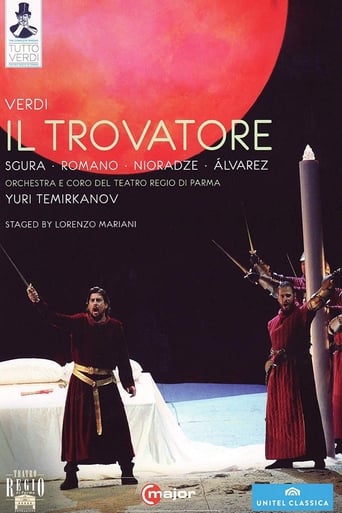
09 Oct 2010

This recording of "Il Trovatore" was held in Parma in 2010. The production is minimalistic. The scenario reminds, vaguely, the lunar surface. In the background, in several scenes, there is a huge full moon, sometimes white, sometimes red - the effect is beautiful and suitable for the nocturnal atmosphere of this opera. Few objects in the scene, including a big horse and giant candles. The costume indicates, directly, who is who: soldiers, nuns, gypsies. Regarding the musical aspects: excellent participation of choir and orchestra. The conductor is the seasoned Yuri Temirkanov. He keeps the orchestra under control (though there is one or two moments of disagreement with the singers), with some pleasant surprises.

01 Aug 2013

Daniel Barenboim conducts the Staatskapelle Berlin in this production of Verdi's opera starring Anna Netrebko and Plácido Domingo. The Count Di Luna believes that his younger brother was murdered years before by a vengeful gypsy but still hopes that he may be alive. When he attempts to court the beautiful Leonora, he is enraged to discover that she has a lover – the troubadour, Manrico. Manrico and the Count duel, and afterwards Manrico reveals to Azucena, the woman he believes to be his mother, that when he had the opportunity to kill the Count he felt something holding him back.
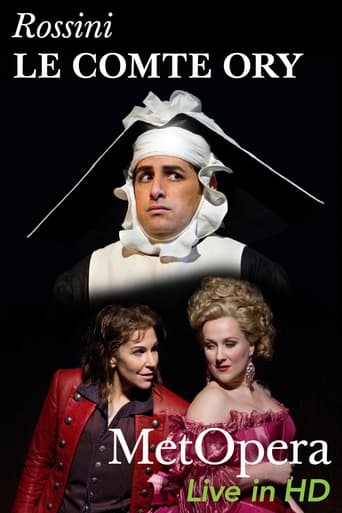
09 Apr 2011

Rossini's "Le Comte Ory" tells the story of a libidinous and cunning nobleman who disguises himself first as a hermit and then as a nun in order to gain access to the virtuous Countess Adele, whose brother is away at the Crusades. The 2011 Met production was directed by Tony Award winner Bartlett Sher, who presented the action as an opera within an opera, updating the action by a few centuries and giving the costume designer, Catherine Zuber, the opportunity to create some particularly extravagant headgear. Juan Diego Florez starred as the title role while Diana Damrau plays Countess Adele, and Joyce DiDonato was in breeches as his pageboy Isolier. Conducted with verve and finesse by Maurizio Benini, the production also features the stylish French baritone Stephane Degout as Ory's bibulous conspirator Raimbaud, charismatic Italian bass Michele Pertusi as the Count's long-suffering Tutor, and, formidable as Adele's housekeeper Ragonde, the Swedish dramatic mezzo Susanne Resmark.

14 Dec 2006

Early recordings of Franco Zeffirelli's 2006 production of Verdi's opera which saw Roberto Alagna's high-profile exit during the second performance. Egypt and Ethiopia are at war. Radames is appointed commander of the Egyptian forces by the King, whose daughter, Amneris, loves Radames. It is in fact Amneris' Ethiopian slave Aida whom Radames loves. Ramades wins the war against the Ethiopians, capturing Aida's father Amonasro in the process. On his return to Egypt he faces a choice between marrying Amneris or betraying his country through his love for Aida.

14 Feb 1980

Live from the Metropolitan Opera, 14 February 1980. This version takes place in Boston rather than Sweden.

01 May 2010

It is a rare opera indeed that calls for one soprano diva and no fewer than six tenors. Mary Zimmerman’s fanciful production of Rossini’s drama, designed by Richard Hudson and with choreography by Graciela Daniele, provides the perfect setting for superstar Renée Fleming’s captivating performance of the title role. A beautiful but evil sorceress in the times of the Crusades, Armida sets out to regain the love of the Frankish knight Rinaldo (Lawrence Brownlee) by putting her magical spells on him. She at first succeeds to draw him into her web of sorcery, but ultimately divine intervention—and his fellow soldiers—free Rinaldo from his enchantment—much to the vengeful fury of Armida and her demons.
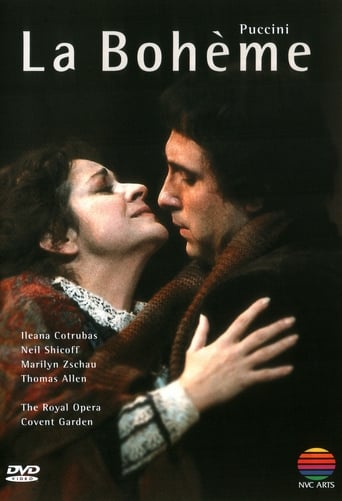
04 Feb 1982

1982 revival of 1974 John Copley production.
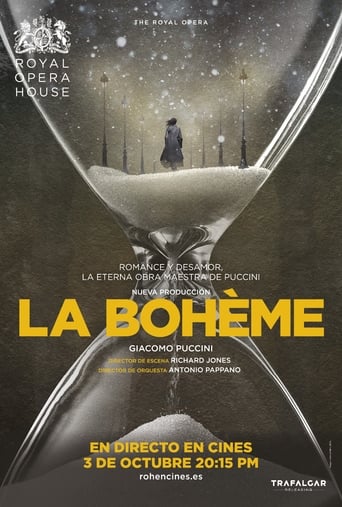
10 Jun 2015

Final performance of the 1974 John Copley production. Live from ROH June 10 2015.
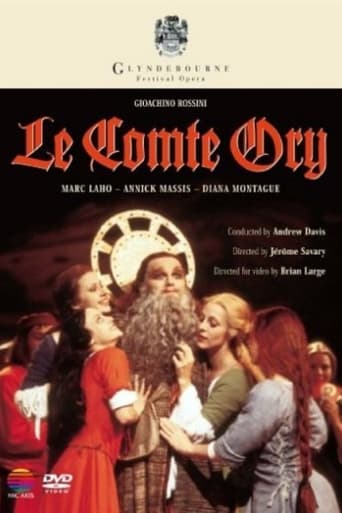
20 Jul 1997

Glyndebourne's intimate opera house provides the perfect setting for Rossini's third French opera, a sparkling medieval comedy of lust and chastity.
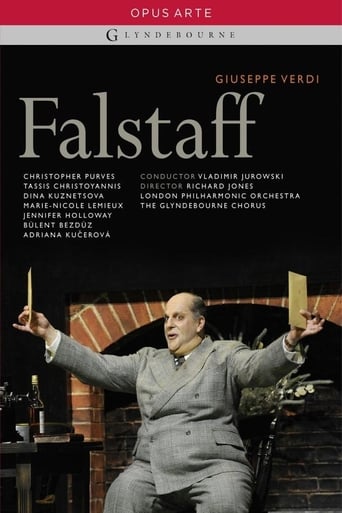
21 May 2009

Live from Glyndebourne 2009
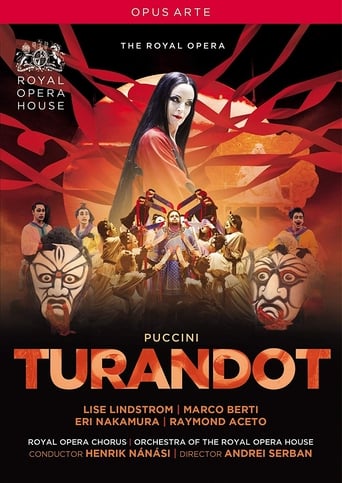
09 Jan 2013

2013 revival of Andrei Serban's 1984 production. Recorded live at the Royal Opera House, September 2013. Andrei Serban's spectacular and thrilling 1984 production of Puccini's final and grandest opera has long been a classic at the Royal Opera House. First filmed for BBC TV in the 80s, this new recording – of its fifteenth revival – is in stunning HD and makes this famous production available for the first time on DVD and Blu-ray. The release will rightfully take its place alongside the outstanding Royal Opera Puccini DVDs of La Bohème, Tosca (on EMI) and Trittico. American Lise Lindstrom is one of the very few contemporary Turandots who can genuinely sing this ‘killer’ role, and is supported by a touching Liù from Japanese soprano Eri Nakamura and an unashamedly Italianite Calaf from Marco Berti. The young Hungarian conductor Henrik Nánási directs the large orchestra and all-important chorus.
07 Dec 1997
Live from La Scala December 7th 1997